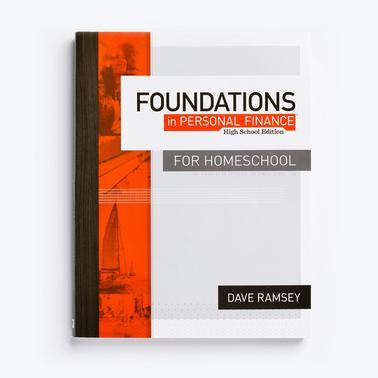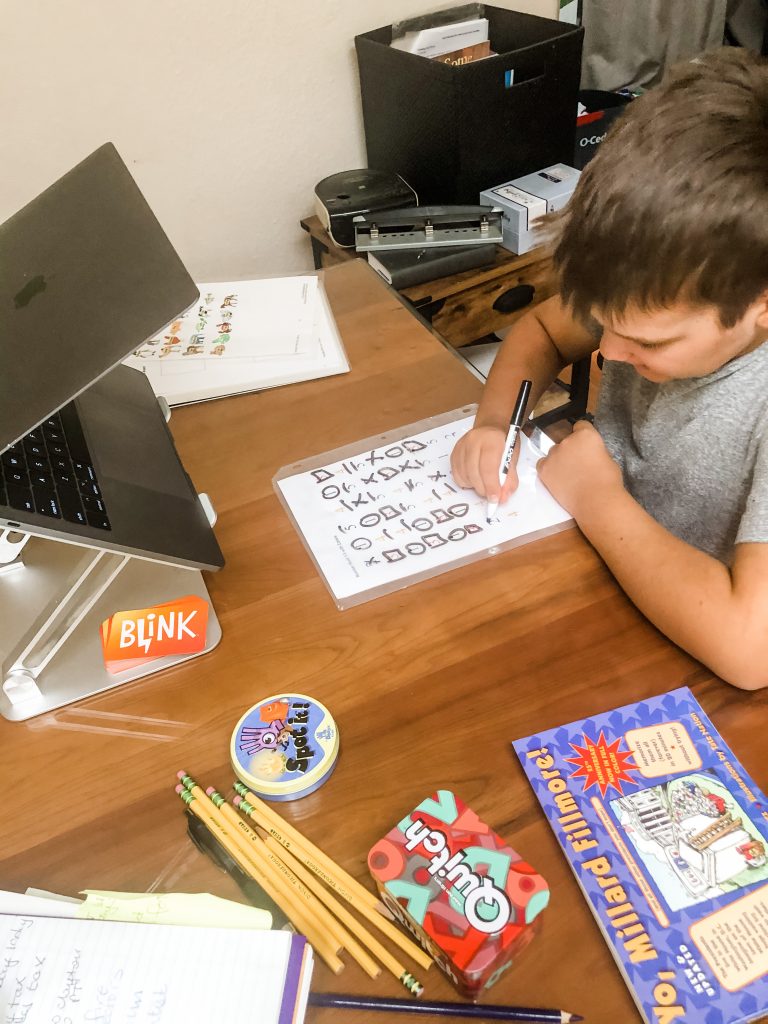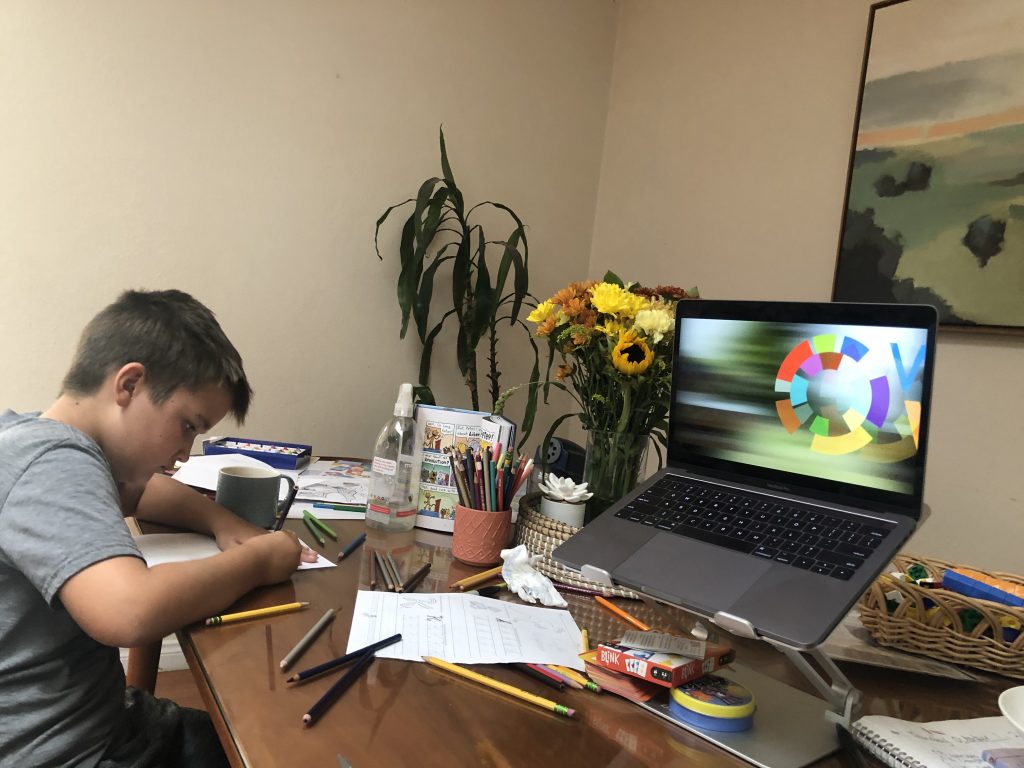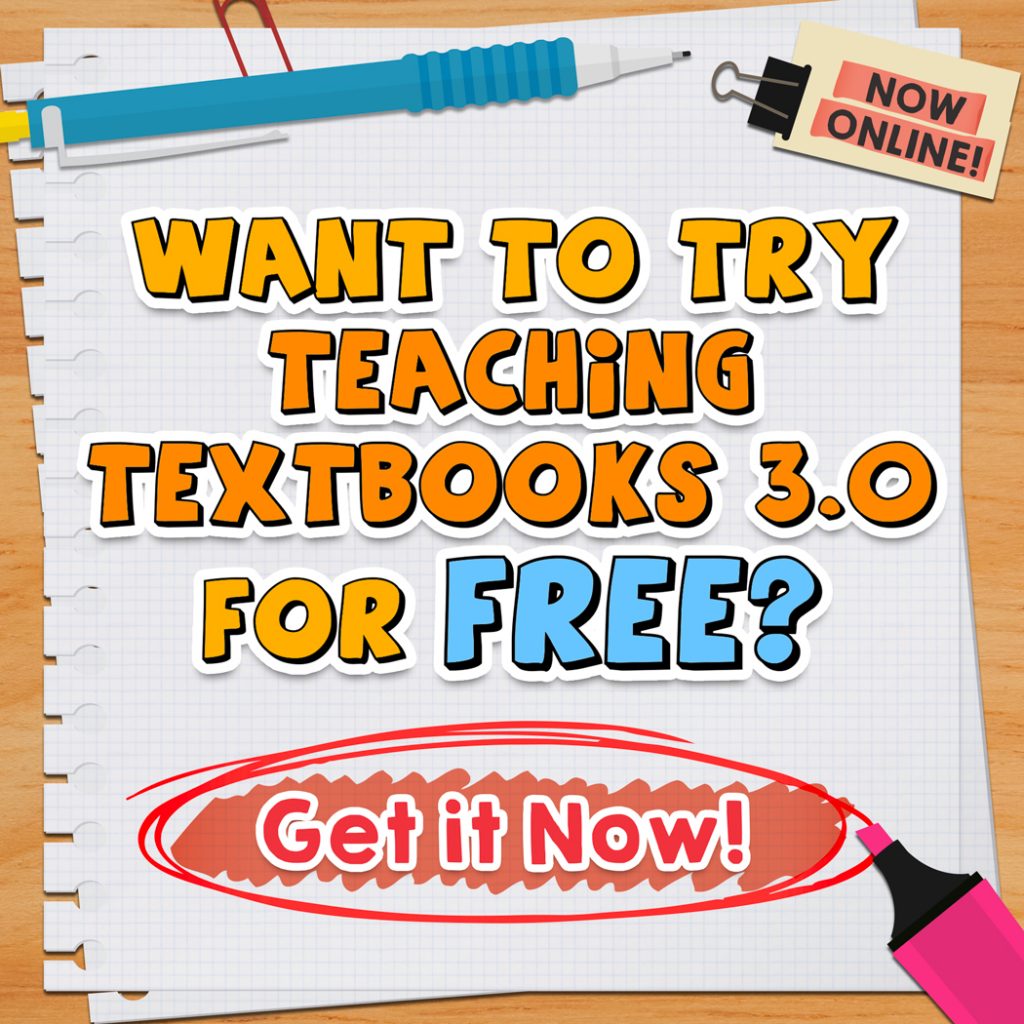Today I’m sharing the homeschool curriculum we are using for our high school junior, sophmore, 7th grader, and 5th grader.

It took some time for me to hone in on what was the best fit for us this year. Even after homeschooling for 25 years, I still battle between choosing what I like and what I know my kids will like! There is a curriculum style that will appeal to you as the parent/teacher and one that will appeal to your kids. Finding a balance between these two is ideal.
For example, I really wanted to study American history this year because it’s an election year with a lot of drama but my kids really wanted to study Medieval history. I went with Medieval but with a program that I really enjoy. This way, they get to learn something that they are interested in and I will actually teach it because we are using a curriculum style that I enjoy too. More on actual curriculum choices below.
High School Homeschool Curriculum Choices
I’ve graduated four kids from our homeschool. I’ve learned to work with them on choosing curriculum so that they are more engaged and motivated. Motivation can be a HUGE issue in high school, especially if your child has attention issues like ADHD.
My 11th grader is a good example of this lack of motivation and attention. I feel a blog series coming on, do you?
For today, I’ll stick with our curriculum choices.
11th Grade Curriculum Choices
Academic goals for this year are to firm up her math foundation and really work on writing skills. She has asked to do a 5th year of high school so although technically she should be a senior, she is a junior with a lighter load. The goal is to add in a part-time, interest-related job once the COVID restrictions are lifted.
Math: Some of my kids have been math whizzes and others, not so much. For this kid who has struggled with Algebra for the past 2 years, we are trying something new. Key to Algebra explains new algebra concepts in simple language, and examples are easy to follow. Word problems relate to familiar situations that help her better understand abstract concepts. It is also designed to help students solve equations and inequalities intuitively before formal solutions are introduced.
Literature & Composition: BJU Press English 11 includes online video instruction and all textbooks and workbooks. I had the privilege of visiting the BJU Press offices earlier this year and was amazed at the high quality of their products. Many of their teachers have been with the company for decades! For me, English is hard to teach in high school. I love the experienced instructors and having everything laid out for me. All my daughter does is log in, watch the videos, and complete the assignments.
Personal Finance: Dave Ramsey’s Foundations in Personal Finance. Understanding money, taxes, investing, credit, etc is critical for young adults. All of our kids take a course in personal finance before they graduate. This course is 100% online and counts for an elective credit.

Photography: Outschool provides tons of inexpensive online courses for homeschoolers. They have a wide variety of photography courses as well. My daughter is choosing courses that are of interest to her. Save $20 on your first course by using my personal link. All of my kids have taken courses from Outschool. Some meet just once, some for a few weeks, and some for an entire semester. They are a perfect way to learn something new and interesting in the comfort of your home!
Dream Big & Take Action: Goal Conquering for Teens: This course from Heather Woodie at Blog, She Wrote walks teens and their parents through setting goals and following through on them.
10th Grade Homeschool Curriculum
My 10th grader is my only traditional learner. This is her 7th year of Classical Conversations (CC). Don’t hate me but she basically does all of her schoolwork with little to no help from me. She’s just one of those kids. My dyslexic kids did CC for a few years. For the most part we enjoyed it. I loved the accountability and community CC provided. After about 5 years, it was enough for the dyslexic ones.
If you’re interested in learning more about CC with dyslexia, here are a few posts I’ve written:
An overview of CC and why/how it works with kids with dyslexia.
Tips for having a successful Challenge A experience.
I also started a Facebook Group called Classical Conversations With Dyslexia
5th & 7th Grade Homeschool Curriculum
My 7th grader is my most profoundly dyslexic of all my kids. His executive function weaknesses have a huge impact on his ability to learn. His diagnoses of dyslexia, dysgraphia, dyscalculia, and ADHD keeps me on my toes for sure. Because he and my 5th-grade son are working at similar levels, we do most subjects together.
Remediation
Remediation is strengthening the foundations of learning. Every child with a language-based learning difficulty like dyslexia will have some form of remediation until they are able to work independently with accommodations.
We used All About Reading with my 7th-grader until 3rd grade when his progress was too slow for my comfort. We moved him to an NILD educational therapist for the next 3 years. He made amazing progress there. He now reads well and has beautiful cursive handwriting. NILD is a powerful program because it works on the underlying processing and memory weaknesses that are so common with dyslexia as well as teaching reading and spelling.
Because this boy still struggles so much with emotional regulation and focus, he’s seeing an Equipping Minds therapist this year. The Equipping Minds program improves working memory, processing speed, attention, comprehension, executive functioning, critical thinking, visual-spatial reasoning, and communication skills to help overcome learning, emotional, and social challenges.
To learn more about some of the Equipping Minds games, see this post: Using Games to Improve Memory and Learning.

I’ll write more on this amazing, evidence-based program as we go through it but both of my boys (10 & 13) enjoy the program as it is all playing games!
Language Arts: 5th & 7th Grade
All About Spelling: I’m working with both boys through Level 2 of All About Spelling. I love, love, love the ease and simplicity of this program. They are both spelling at a much lower level than they read (totally common for kids with dyslexia). With AAS, we review spelling rules, write lists of words that follow the rule, and then I dictate phrases and sentences that include the rule we are learning as well as the rules mastered previously. It provides the perfect amount of instruction and review my kids need right now.
All About Reading: I bought both boys a level of All About Reading but haven’t started them yet. They are reading independently so we are focusing on spelling for now. The All About Learning program separates spelling and reading because spelling skills develop slower than reading skills. Kids can move ahead in reading without being held back by a lack of spelling mastery.
<a href=”https://www.allaboutlearningpress.net/go.php?id=526_37_1_454″ target=”_blank”><img style=”border:0px” src=”https://www.allaboutlearningpress.net/media/banners/AAR-Alternate-Leaderboard-728×90.jpg” width=”728″ height=”90″ alt=”All About Reading”></a>
Read my full review of All About Reading here.
Read my comparison of the top 4 Orton-Gillingham reading programs here.
Daily Grams: Daily Grams provides a page of grammar skills a day. I am very happy with how both boys are remembering what they are learning. Daily Grams provides a TON of review which is just what my boys need. We are using Grade 3 because I already owned it but it’s a good place to start and both boys can easily read the examples and instructions.
WriteShop Junior Level F: This level is good for 5-6th grade or for 7th graders who haven’t had much practice with writing/composition. WriteShop works well for our family because the projects are varied, fun, and interesting so my kids like it. It also provides a ton of structure and support for me as mom/teacher.
Read more about why we love WriteShop:
Teaching Writing to the Reluctant Writer
How I’m Teaching my Child With Dyslexia and Dysgraphia to Write
What to do When You’re Struggling to Teach Writing
Math: 5th & 7th Grade
We’ve been happily using Teaching Textbooks for math for over 12 years. I love how my kids can be independent with math because each lesson is taught via video. They enter their answers directly into the program and get immediate feedback. If they get the problem wrong, they can have another chance or a hint, and if they get the problem wrong twice, they can watch the solution. Teaching Textbooks truly is Like Having the ‘Good’ Math Teacher Every Year.
Elephant Learning. We’ve been using this math supplement for 10 minutes a day to strengthen the boys’ math sense. It is a games-based program similar to ST Math. Both boys can use the program for one monthly fee.
History & Geography: 5th & 7th Grade
Story of the World: The Middle Ages and Activity Book. This 4-part series studies history chronologically from Ancient Times to the Modern Age. I love it because it can be used by a wide range of ages (3-8th grade) and the Activity Book is worth it’s weight in gold. It’s full of comprehension questions, narration prompts, optional extra reading, fun, ideas for hands on activities, maps, and coloring pages for each chapter. My kids love it because it is full of stories of people who lived at the time. They color or draw while I read. You can also get the books on CD and listen to them narrated by famous story-teller, Jim Weiss.
Science: 5th & 7th Grade
We’re going somewhat easy on science this semester as we spend more time on history and language arts each day. My 7th grader is taking an online STEM class through our local YMCA.
Both boys do Cindy West’s No Sweat Nature Study geared for grades 1-8. No Sweat Nature Study is a live class taught twice a month. Each class lasts 40-60 minutes and includes opportunities for students to learn about the science topic at hand, complete a nature notebooking page, gain rich scientific vocabulary, interact with the teacher via a chat function, and generally have fun! Classes really are a lot of fun and it is surprising how much we learn about the world around us.
Current Events
We’ve been loving our subscription to World Watch News. There’s a daily 10-minute video of news presented in a way that is appropriate for kids to teens. We watch it during lunch every day and all the kids love it!

More posts about curriculum:
4th grade reader suggestions. This post includes a number of programs that I have not used but other families with dyslexia have and recommended.
Tips for homeschooling middle school. This post talks about transitioning to more independent learning including adding in assistive technology.
Links to of all of my curriculum posts.
Or download my free 50-page curriculum guide below:






We have a very similar year. We have a a 10th grade boy, 8th grade boy ( who has dyslexia, dysgraphia and ADHD), a 5th grade boy and a 3rd grade boy( we STRONGLY suspect this little guy has learning differences too). Our high schooler is a strong independent learner, so almost all of his classes are live online. I just help him when he asks. The other three are all with me.
I started WriteShop last year, based on your recommendation, and really liked it. I went all in and did three separate levels for three separate boys. Honestly, it was a bit much for me. This year I decided that my struggling third grader (this boy is being evaluated for dyslexia, etc. next week) would just focus on All About Reading level 3 and spelling level 2 and we wouldn’t do WriteShop until he was finished with AAR. Once he has finished that curriculum we will resume WriteShop again, most likely 5th grade. In the mean time he will be writing for science and history and the sentences and phrases that I dictate from AAS.
We are off to a smooth start. I am so grateful for all that I have learned from you and all the parents on this website and Beyond the Box Learning! Learning to trust myself and use my judgment about what our boys need has been such a gift. No one knows these boys better then me, especially since we have always homeschooled. I can decide what we need to do. I think this confidence is a big reason we are off to such a strong start. The boys sense my peace, and it makes them feel comfortable too. We will be able to work together and learn together and even have fun along the way.
What a wonderful testimony Sarah! I’m so glad you’re feeling more confident.:) I like your plan for moving ahead. Hope the evaluation goes well. They can be tough!
Hello,
Your website is so helpful to me! Both of my children are dyslexic and we are homeschooling for the first time this year; Ages 9, 11.
I haven’t yet purchased a laptop / computer for them to use. I am curious if you have written about PC vs Mac vs Chrome operating systems, keyboard type or screen sizes and through your experience, which would be best for dyslexics.
Thank you!
I haven’t written about this yet. My older kids have Chrome Books that have been very good. We buy them refurbished off of Groupon. 🙂 The Chrome extensions have been very helpful for writing and spelling.
Thank you! We also enjoy gold mining in the SOTW activity book!
When you switched a child from an OG approach to a NILD therapist, did you see a reason to also continue the OG training? Or would you say that a NILD therapist is like combining a language therapist with an OT? My son has been doing Barton for four years and still struggles quite a bit. He is 12 years old now.
Once we switched to NILD, we stopped all OG at home. NILD includes reading instruction. 🙂